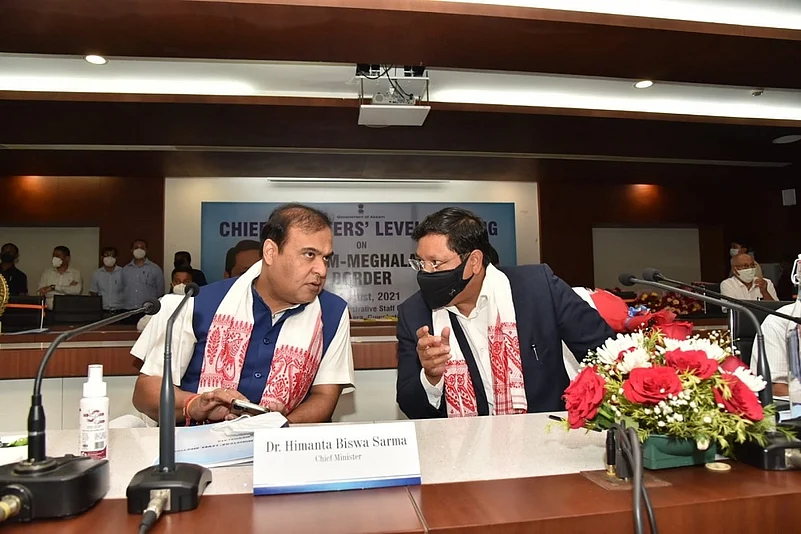Assam Chief minister Himanta Biswa Sarma and his Meghalaya counterpart Conrad K Sangma on Sunday decided to start work on resolving the inter-state boundary dispute in six areas over which differences persist.
An agreement has been signed between the two North-eastern neighbors earlier this year for settling the issues in six other similar sites.
“We have decided to start work on resolving the problems in the remaining six disputed sites. From the Meghalaya side, these areas are located in three districts. Three regional committees (RCs) to be headed by a cabinet minister each will be formed by both states to take it forward,” Sarma told reporters after the meeting.
He said the committees will be notified within 15 days and they will immediately begin site visits and try to resolve the dispute 'according to the broader perimeter' laid down in earlier discussions between the two states.
“This was decided during my 9th meeting with my Meghalaya counterpart Shri @SangmaConrad ji,” Sarma tweeted later.
"Once the RCs are formed, site visits & public consultation will also be initiated. In order to give confidence to the people & in the spirit of commitment to resolve our border issue, HCM of Assam @himantabiswa & I will make visits to some of the areas," Sangma said in a Twitter post.
He tagged Prime Minister Narendra Modi and Union Home Minister Amit Shah in the tweet.
The two states had signed a memorandum of understanding for ending the five-decade-old border dispute in six of the 12 disputed areas in New Delhi on March 29 in the presence of Shah.
The agreement was reached on the basis of recommendations by regional committees formed by the two states as well as consultations held with civil society and political parties.
“We hope and pray that like the first phase, the second phase will also be smooth and we will see some kind of resolution between the two sides,” Sarma said.
The Assam CM said the areas involved in the second phase are a “little complicated” compared to the first phase as it involved sites like Lampi in Assam's Kamrup district and parts under the Karbi Anglong Autonomous Council (KAAC).
He said representatives of KAAC will be included in the regional committee formed for that part.
“If and where necessary, the chief ministers will meet and give guidance to the regional committees,” Sarma added, reiterating the two states' commitment to resolve the disputes amicably and satisfactorily.
The six areas that were taken up for final settlement in the first phase comprise Tarabari (4.69 sq km), Gizang (13.53 sq km), Hahim (3.51 sq km), Boklapara (1.57 sq km), Khanapara-Pilangkata (2.29 sq km) and Ratacherra (11.20 sq km).
As per the agreement, out of the 36.79 sq km area taken up for resolution in the first phase, Assam will get 18.46 sq km and Meghalaya 18.33 sq km.
“For the 6 areas of differences in Phase 1, the process is moving forward with the survey and demarking of borders underway. Both Meghalaya & Assam Govt. are working to ensure the completion of the survey," Sangma said in another tweet.
The remaining six areas include villages in disputed blocks 1 and 2 transferred from the then United Khasi and Jaintia district to Assam's Karbi Anglong district for administrative convenience in the 1950s.
Meghalaya was carved out of Assam as a separate state in 1972 and it challenged the Assam Reorganisation Act, 1971, leading to disputes in 12 areas of the 884.9 km long border between the two states.
(Inputs from PTI)


























